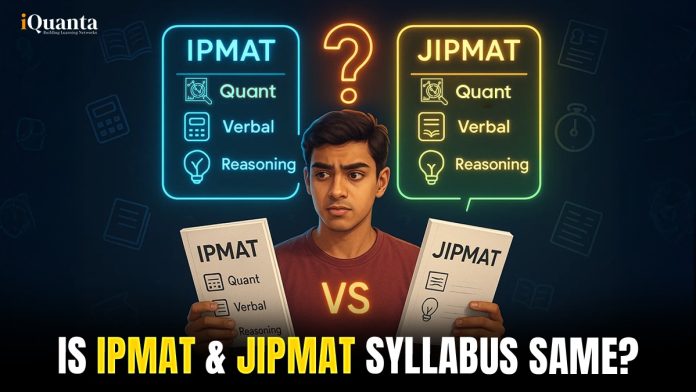When students aim to secure a seat of 5 years IPM (Integrated Programme in Management) at top IIMs after their class 12th exam then one question naturally comes up to their mind: Is the IPMAT and JIPMAT syllabus same?. IPMAT Indore, IPMAT Rohtak and JIPMAT exams are the gateway to the premiere business schools of the country but they are not the same in structure, exam pattern, difficulty level as well as syllabus depth.
In 2026, the IPMAT Indore exam expected to continue with the higher-level mathematics along with the Verbal Ability which is making it more challenging for the students. Whereas, JIPMAT and IPMAT Rohtak focus only on the class 10-level Quantitative Aptitude, Verbal Ability as well as Logical Reasoning questions which is making them relatively flexible and easier for aspirants. The difference in syllabus and the exam pattern helps aspirants to prepare a strategic plan to crack IPMAT Indore, IPMAT Rohtak and JIPMAT exams.
In this blog we will be covering the comparison of the IPMAT Indore, IPMAT Rohtak and JIPMAT syllabus, their differences and exam patterns along with the key preparation tips for these exams.
Check IPMAT Eligibility Tracker : Click Here
Overview of IPMAT Indore, IPMAT Rohtak and JIPMAT Exam
The IPMAT (Integrated Programme in Management Aptitude Test) and JIPMAT (Joint Integrated Programme in Management Admission Test) are the two most important routes for management aspirants who want to enter IIMs early after their class 12th exam to pursue a 5 years Integrated Programme in Management. Both exams assess a candidate’s aptitude in QA, LR and VA but the exam structure and the level of difficulty may vary for the common question: Is IPMAT and JIPMAT syllabus same?
While IPMAT Indore exam is well known for its higher difficulty level especially in higher mathematics (where 70% are coming from maths syllabus of class 6th to 10th and 30% are coming from class 11th to 12th) whereas IPMAT Rohtak and JIPMAT are relatively balanced and flexible for students to crack, focusing on the class 10th mathematics with a good weightage on logical reasoning as well as verbal ability. IPMAT Indore exam is conducted by IIM Indore and IPMAT Rohtak exam is conducted by IIM Rohtak whereas JIPMAT is conducted by the NTA for institutes like IIM Bodhgaya and IIM Jammu.
| Features | IPMAT Indore | IPMAT Rohtak | JIPMAT |
| Conducting Body | IIM Indore | IIM Rohtak | NTA (for IIM Jammu & IIM Bodh Gaya) |
| Sections | Quantitative Aptitude(MCQs + SA), Verbal Ability | Quantitative Aptitude, Verbal Ability, Logical Reasoning | Quantitative Aptitude, Verbal Ability, Logical Reasoning |
| Math Level | 70% maths syllabus are from Class 6th to 10th and 30% syllabus is higher mathematics from class 11th to 12th (excludes Integration, Differentiation, Limits, Derivatives and other topics) | Up to Class 10 | Up to Class 10 |
| Difficulty Level | Moderate to Difficult | Easy in comparison to IPMAT Indore | Easy in comparison to IPMAT Indore |
| Mode of Exam | Computer-Based | Computer-Based | Computer-Based |
Is IPMAT and JIPMAT Syllabus Same in 2026?
Many students think about a common question but a very important one, Is IPMAT and JIPMAT syllabus same?. IPMAT Indore, IPMAT and JIPMAT exam test aspirants on the basis of aptitude level that covers Quantitative Aptitude, Verbal Ability as well as Logical Reasoning along with the depth and the difficulty level of the exam varies accordingly. The IPMAT Indore exam includes higher mathematics (not including integration, differentiation, limits and other topics. For more better idea about this have a look) & QA, Logical Reasoning, and Verbal Ability. This makes IPMAT Indore a tougher exam whereas JIPMAT and IPMAT Rohtak are easier in comparison to more IPMAT Indore exams.
Section-Wise Syllabus: Is IPMAT and JIPMAT Syllabus Same?
IPMAT Indore Syllabus
| Section | Topics |
| Quantitative Aptitude | Number System– Finding Unit Digit, Cyclicity, Simplification, BODMAS, Remainder Theorems, HCF & LCM, HCF LCM Of fractions, Surds & Indices, Concept of Factors, Divisibility Rules in detail, Factorials, Mixed Questions with other topics Arithmetic– Percentages, Profit Loss & Discount, Ratio & Proportion, Partnerships, Average, Mixture & Alligation, Simple & Compound Interest, Time & Work, Pipes & Cisterns, Time, Speed & Distance, Boats & Streams, Relative Speed, Linear Races, Trains, Circular Tracks TSD, Mixed Questions with other topics Algebra – Algebraic Identities, Linear Equations, Quadratic & Cubic Equations, Nature of Roots, Discriminant, Inequalities, Logarithms, Functions, Modulus Functions, Arithmetic Progressions, Geometric Progressions, Max/Min Values of Functions, Range & Domain of Functions, Binomial Theorem Geometry & Mensuration – Lines & Angles, Triangles & Circles (Theorems), Quadrilaterals & Areas, Polygons & Angles, Regular Polygons, Coordinate Geometry, Mensuration (Surface Area & Volumes of 3D Figures) |
| Higher Mathematics | Matrices & Determinants, Set Theory & Venn Diagrams, Relations & Functions, Sequence & Series (AP & GP), Permutation & Combination, Inequalities, Domain & Range, Probability, Modulus Functions, Binomial Theorem, Equations of Lines & Circles, Trigonometry (Height & Distance), Mean, Median & Mode |
| Logical Reasoning & Data Interpretation | Logical Reasoning – Random Puzzles, Caselets, Linear & Circular Arrangement, Games & Tournaments (Knockout & Round Robin), 3 Set Venn Diagrams (Union Formula, Max/Min values, Optimization) Data Interpretation – Bar Graphs, Tables, Pie Charts, Percentages & Calculations, Average-based DI Sets, Ratio-based DI Sets, Calculation-based DI Sets |
| Verbal Ability & Reading Comprehension | Grammar – Noun & Pronoun, Adverb & Verb, Prepositions, Conjunctions, Direct & Indirect Speech, Figures of Speech, Articles, Active–Passive Voice, Poetic Devices, Subject-Verb Agreement, Sentence Correction Reading Comprehension – Meaning of words, Tone of author, Tone of passage, Main Idea, Reasoning from passage, Idioms/Phrases, Passage-based Qs Verbal Ability – Error Spotting, Fill in the Blanks, Sentence Completion, Para Jumbles, Sentence Improvement Vocabulary – Synonyms & Antonyms, Spelling Errors, One Word Substitution, Odd One Out, Incorrect Word Usage, Phrasal Verbs, Para Completion, Idioms & Phrases |
IPMAT Rohtak Syllabus
| Section | Topics |
| Quantitative Aptitude | Number System: Finding Unit Digit, Simplification, Remainder Theorems, HCF & LCM, HCF & LCM of Fractions, Surds & Indices, Concept of Factors, Divisibility Rules, Factorial Arithmetic: Percentage, Average, Age-based problems, Partnership, Profit & Loss, Discount, Ratio & Proportion, Simple & Compound Interest, Mixture & Alligation, Time–Speed–Distance, Boats & Streams Algebra: Algebraic Formulae, Linear Equations, Cubic & Quadratic Equations, Indices & Surds, Trigonometry, Logarithms, Inequalities Geometry: Basics of Geometry, Lines & Angles, Triangles, Circles, Quadrilaterals, Polygons, Coordinate Geometry, Mensuration (Volume & Surface Area), Height & Distance based on Trigonometry |
| Verbal Ability & Reading Comprehension | Grammar: Noun & Pronoun, Adverb & Verb, Prepositions, Conjunctions, Direct & Indirect Speech, Figures of Speech, Idioms & Phrases, Etymology & Roots, Articles, Active–Passive Voice, Subject–Verb Agreement Reading Comprehension: Word Meaning, Tone of the Author, Tone of the Passage, Main Idea, Inference-based Questions Verbal Ability: Error Spotting, Fill in the Blanks, Sentence Completion, Para Jumbles, Sentence Improvement, Sentence Correction Vocabulary: Synonyms & Antonyms, Spelling Errors, One Word Substitution, Odd One Out, Word Usage, Analogy |
| Logical Reasoning & Verbal Reasoning | Logical Reasoning: Number & Letter Series, Coding–Decoding, Logical Sequence Series, Cubes & Dice (cutting & coloring), Venn Diagrams, Blood Relations, Syllogism, Clock & Calendars, Input–Output, Linear & Circular Arrangement, Bar Graphs & Table-based DI Sets, Line Charts & Pie Charts, Data Sufficiency, Mirror & Water Image, Ranking, Inequalities, Distance & Direction, Pattern-based Images. Verbal Reasoning: Analogies, Statement & Conclusion, Statement & Assumption |
JIPMAT Syllabus
| Sections | Sub-sections | Topics |
| Quantitative Aptitude (QA) | Number System | Finding Unit Digit, Simplification, Remainder Theorems, HCF & LCM, HCF LCM of Fractions, Surds & Indices, Concept of Factors, Divisibility Rules, Factorials |
| Arithmetic | Percentage, Average, Age-based problems, Partnership, Profit Loss & Discount, Ratio & Proportion, Simple & Compound Interest, Mixture & Alligations, Time, Speed & Distance, Boats & Streams | |
| Algebra | Algebraic Formulae, Linear Equations, Cubic Equations, Quadratic Equations, Indices & Surds, Trigonometry till class 10 | |
| Geometry | Basics of Geometry, Lines & Angles, Triangles, Circles, Quadrilaterals, Polygons, Coordinate Geometry, Mensuration, Height & Distance in Trigonometry | |
| Verbal Ability & Reading Comprehension (VA & RC) | Grammar | Noun & Pronoun, Adverb & Verb, Prepositions, Conjunctions, Direct & Indirect Speech, Figures of Speech, Idioms & Phrases, Etymology & Roots, Articles, Active–Passive Voice, Subject-Verb Agreement |
| Reading Comprehension | Word meaning in passage, Tone of author, Tone of passage, Main idea of passage | |
| Verbal Ability | Error Spotting, Fill in the blanks, Sentence Completion, Para Jumbles, Sentence Improvement, Sentence Correction | |
| Vocabulary | Synonyms & Antonyms, Spelling Errors, One Word Substitution, Odd one out, Word Usage, Analogies | |
| Logical Reasoning (LR) | Analytical Reasoning | Number & Letter Series, Coding-Decoding, Logical Sequence Series, Cubes & Dices (cutting & coloring), Venn Diagrams, Blood Relations, Syllogism, Clock & Calendars, Input–Output, Linear & Circular Seating Arrangement, Bar Graphs & Table-based DI Sets, Line Charts & Pie Charts, Data Sufficiency, Mirror & Water Image, Ranking, Inequalities, Distance & Direction, Pattern-based Images |
| Verbal Reasoning | Analogies, Statement & Conclusion, Statement & Assumption, Facts & Inferences, Data Interpretation sets |
Common Topics In IPMAT Indore, IPMAT Rohtak and JIPMAT Exam
Aspirants have a continuous question about the IPMAT Indore, IPMAT Rohtak and JIPMAT syllabus and it is important to keep in mind about the basic difference in depth, a large portion of the syllabus covered. This makes aspirants’ preparation plan easier and they will be able to target IPMAT Indore, IPMAT Rohtak and JIPMAT exams together. Here is a table below that comes with common topics that both the exams covered.
| Sections | Common Topics Across IPMAT Indore, IPMAT Rohtak & JIPMAT |
| Quantitative Aptitude | Arithmetic, Algebra, Number System, Geometry & Mensuration, Data Interpretation |
| Verbal Ability | Reading Comprehension, Grammar, Vocabulary, Para Jumbles, Sentence Completion |
Key Differences in the Syllabus of IPMAT Indore, IPMAT Rohtak and JIPMAT
While IPMAT Indore, IPMAT Rohtak and JIPMAT exams test the aspirant’s aptitude and verbal ability, the scope and depth of the syllabus are not exactly the same for the exams. IPMAT Indore is more rigorous towards higher mathematics whereas JIPMAT includes the topics related to reasoning based similar to IPMAT Rohtak.
- IPMAT Indore has higher level QA as well as including advanced topics like Matrices, high order algebra and Trigonometry.
- IPMAT Rohtak and JIPMAT both exams include DI (Data Interpretation) and logical reasoning sections unlike IPMAT Indore does.
- The Verbal Ability section in the IPMAT Indore exam covers heavy passages whereas the JIPMAT exam covers slightly easy concepts with direct grammar and vocabulary.
- Overall, the difficulty level is more in IPMAT Indore exam as compared to other IPMAT Rohtak and JIPMAT.
Exam Pattern: Side-by-Side Comparison
In this section we are covering the exam pattern of IPMAT Indore, IPMAT Rohtak as well as JIPMAT exam. Here is a detailed table of both the exams mentioned below:
| Features | IPMAT Indore | IPMAT Rohtak | JIPMAT |
| Total Sections | 3 – Quantitative Ability (MCQ), Quantitative Ability (SA), Verbal Ability | 3 – Quantitative Ability, Verbal Ability, Logical Reasoning | 3 – Quantitative Aptitude, Verbal Ability, Logical Reasoning |
| Total Questions | 90 | 120 | 100 |
| Exam Duration | 2 hours (120 minutes) | 2 hours (120 minutes) | 2.5 hours (150 minutes) |
| Marking Scheme | +4 for correct, –1 for wrong (MCQs) No negative for SA | +4 for correct, –1 for wrong | +4 for correct, –1 for wrong |
| Difficulty Level | Moderate to Difficult | Easier than IPMAT Indore | Easier than IPMAT Indore |
Preparation Tips for IPMAT Indore, IPMAT Rohtak and JIPMAT Exam 2026
Here are some points that covered the preparation tips for IPMAT Indore, IPMAT Rohtak and JIPMAT Exam 2026:
- Focus on higher mathematics for IPMAT Indore exam whereas for IPMAT Rohtak and JIPMAT prioritize the arithmetic and DI.
- Practice Reading Comprehension regularly to enhance your vocabulary skills as well as to revise the grammar section.
- For logical reasoning & DI (Rohtak/JIPMAT only) start solving puzzles, seating arrangements as well as data tables to boost your confidence as well as accuracy.
- It is advised for aspirants to go for full-length as well as sectional mock tests to build accuracy, speed and cover weaker sections.
- Allocate more time to prepare QA section for IPMAT Indore but along with it is important to go for the balanced preparation approach of JIPMAT and IPMAT Rohtak.
Conclusion: Is IPMAT and JIPMAT Syllabus Same?
The IPMAT Indore, IPMAT Rohtak and JIPMAT syllabus for these exams share a good level in Quantitative Aptitude as well as Verbal Ability but they are not exactly the same. IPMAT Indore have special section that is higher mathematics that has already mentioned in the blog above, whereas IPMAT Rohtak and JIPMAT both exams have the Logical Reasoning and Data Interpretation to test students problem-solving skills.
So to answer this question, is the IPMAT and JIPMAT syllabus same? covers some core topics that overlap but the difficulty level of exam and depth help aspirants to more focus on each exam.
If you are looking for a structured preparation for IPMAT along with 24×7 doubt solving, then you can go for iQuanta’s IPMAT Course
Is IPMAT and JIPMAT Syllabus Same? FAQs
No, IPMAT Indore, IPMAT Rohtak and JIPMAT syllabus is not exactly same rather there are some common areas that both the exam share.
IPMAT Indore is comparatively more tougher than IPMAT Rohtak and JIPMAT due to its higher level mathematics.






